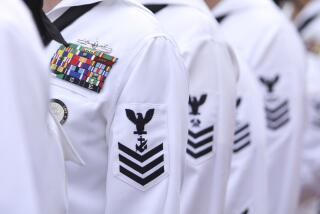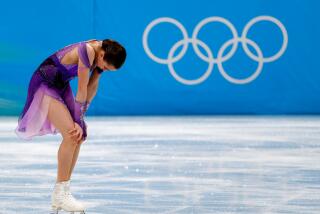Tour de France using new rules to fight doping
- Share via
PARIS -- The fight against doping will have different rules at this year’s Tour de France, with officials sticking closely to the cyclists in a bid to ensure none slips through the testers’ net.
More random tests before and during the race, an international network of anti-doping resources, a breakthrough in detecting human growth hormone within 24 hours and eight specially trained chaperons to shadow riders means there should be little chance of an escape route for any would-be Tour cheat.
“There’s just been so much testing this year that it’s going to be a clean Tour. It has to be,” said veteran Australian cyclist Stuart O’Grady. “I can’t see any other [way]. It would be fantastic for the sport, and the sport needs it. We need to get rid of the idiots.”
Doping scandals have left the showcase event without a defending champion for the past two years, and a deep rift between race organizers The Amaury Sport Organization and cycling’s governing body means UCI president Pat McQuaid will have no say in the race which began Saturday and concludes July 27.
Spaniard Alberto Contador, last year’s winner, couldn’t be at the start line in Brest on Saturday because his Astana team is barred for having soiled the race’s reputation in 2006 and 2007 -- albeit under different management.
The Tour will be held under French law and with an international network cooperating. There will be steep financial penalties for teams whose riders are caught cheating.
“From what I hear everything is confusing, there’s different rules, and different this and different that,” said Astana team director Johan Bruyneel. “There’s nothing worse than always creating special rules for special events.”
Since the UCI will not be sending drug testers, the French Anti-Doping Agency (AFLD) takes charge and will work in tandem with the French cycling federation and the World Anti-Doping Agency. A WADA-accredited lab in Lausanne, Switzerland, is expected to detect HGH within 24 hours -- potentially a major breakthrough for the doping-scarred event.
The UCI and organizers of cycling’s three big events -- the Tour, Vuelta and Giro -- have locked horns for four years about how the sport should be governed.
The feud reached a crescendo in March when ASO ran the Paris-Nice race under its own laws and the UCI responded by suspending the FFC for backing the ASO. French anti-doping authorities took care of testing, and there were no positive results.
“It went very well at Paris-Nice,” said Tour director Christian Prudhomme. “I don’t know why it wouldn’t work well on the Tour de France.”
The Italian Olympic Committee will look after testing when the race snakes briefly through Italy toward the Alps -- but these sudden new changes have left some riders with more questions than answers.
“I don’t think everybody is in the clear about what happens behind the scenes,” O’Grady said. “Obviously there’s a big power play going on between UCI and the Tour de France. Both want to be in control.”
ASO is desperate to avoid another Tour such as in 2006 and 2007.
Floyd Landis was stripped of his 2006 Tour crown because of a positive test for testosterone, and last year’s race leader Michael Rasmussen was kicked out near the end for having lied about his whereabouts when he skipped pre-competition doping tests.
Fan favorite Alexandre Vinokourov also was booted last year for a positive test for a blood transfusion after winning the stage 13 time trial, and Iban Mayo tested positive for the blood booster EPO.
The AFLD stepped up random tests at pre-Tour training camps, and every rider was to be blood tested before Saturday “so that everyone understands that there is a sword of Damocles which is likely to fall,” AFLD chief Pierre Bordry said.
The random testing is aimed at eliminating outdated methods that were easy to beat. In previous Tours, for example, riders knew before the end of each stage that the rider finishing fifth would be tested, so it was merely a case of finishing sixth to avoid a test.
“It’s important that these people know that they could be tested at any moment so that they don’t build their doping programs around the way the testers work,” Bordry said. “If we decide that the stage winner will be tested, then the person who has a banned substance will make sure he finishes second. But if it’s random, it’s impossible to control.”
The Chatenay-Malabry lab that detected Landis’ synthetic testosterone two years ago will continue with urine, EPO, testosterone, and blood transfusion tests. But it is not equipped for HGH.
“That is why I signed a convention with the director of the Lausanne laboratory,” Bordry said. “He does the testing. We tell him how we transported (samples), by what means, and he has the responsibility to get (the results) back to us.”
The Paris-based AFLD has stayed out of the cycling feud, and as a gesture of goodwill it will forward all blood test results to the UCI to help with its biological passport profiles.
“There is no reason to have a conflict of interests,” Bordry said.
Bordry’s offer was welcomed by McQuaid.
“It is another parameter, another point for all of those riders that we can put in their profile,” McQuaid said. “The fact that the Tour de France is being run outside the UCI and AFLD are doing it, which they are obligated to do because it is in French territory, that has nothing to do with the relationship between us.”
Teams will be fined up to $155,000 if one of its riders tests positive. Eric Boyer, head of the International Association of Professional Cyclist Groups, said the teams signed contracts accepting the new rule.
Under contract rules, France’s Chamber of Arbitration for Sport -- which falls under the French national Olympic committee -- can rule on alleged doping cases within 24 hours without the need for a “B” sample.
A rider can be thrown out before the start of the next day’s stage if he’s considered to be in breach of his contract.
With its tortuous mountain climbs in searing heat, lightning-fast bunched sprints, and perilous downhill chases on wet roads, the Tour is hard enough without all the bickering, the chopping and changing of rules, and the power struggles.
“Every organizer wants to put on a harder race, a bigger mountain, a harder time trial,” O’Grady said. “They’re putting the riders and athletes under more and more stress.
“The federations and the organizations don’t seem to get on,” he added. “At the end of the day we’re just trying to do the sport we love. It will be really disappointing if these guys can’t get on and they spoil the future of cycling.”
More to Read
Sign up for Essential California
The most important California stories and recommendations in your inbox every morning.
You may occasionally receive promotional content from the Los Angeles Times.













